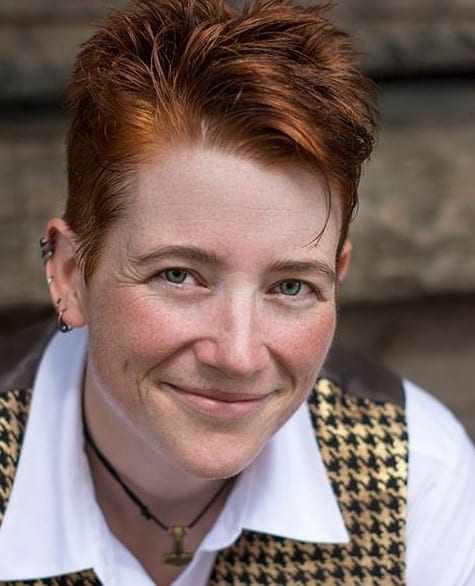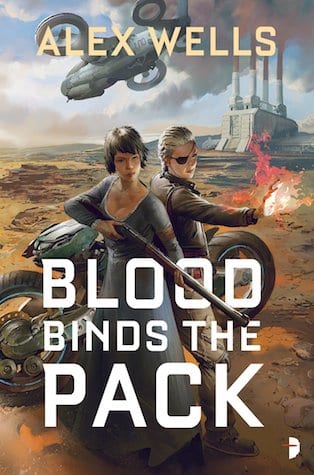A few months back, I had the pleasure of reviewing Murder on the Titania, a collection of short stories featuring a queer, genderbent, steampunk version of Sherlock Holmes named Marta Ramos. I fell in love with the worldbuilding and tone and wanted more. Who was this person who managed to write one of the best modern literary adaptations of Holmes and make the character so different at the same time? I wanted to get to know them, pick their brain, hear about their process. I knew they had to be fascinating and fun if they came up with Marta. When I saw that the author, Alex Acks, would be at WisCon for a book release party, I knew I had to meet them. So I did, they agreed to an interview, and the rest is history. And by history, I mean this post.

Gretchen: So, what made you want to be a writer? It’s not exactly the most lucrative career these days, especially for independent authors!
Alex: The thing is, I’ve always been a writer. As long as I’ve known how to write, I’ve been trying to make my own little books. So it’s more that I’ve always been and always will be a writer, and I’ve reached a point in my art where what I do is good enough that people will give me money for it. I’d sure love to be at a point where I could write full time, since I’d be able to produce more and better and faster, but for now I’ve got a day job. Not stressing about money so much also helps with the writing.
G: Your most recent release, Murder on the Titania, is a collection of short stories I had pitched to me as “genderbent, steampunk Sherlock Holmes.” It’s a fabulous premise, so what I want to know is, where did Marta Ramos come from?
A: She really did come out of Sherlock Holmes. I’m a massive Holmes fan, and have been since my mom read all of the short stories and novels to my brother and me when we were kids. What got me to take the step and make her as a character was that some friends of mine were doing a challenge where we’d each write a novella. And I’d just gotten into steampunk and wanted to have some mystery-adjacent adventures in it, and I thought why not go Holmesian, but with a character I could identify with a lot more? And especially one that could tweak a lot of the more problematic tropes of steampunk as a subgenre! She grew out of that.
G: Not only is Marta Ramos intelligent, badass, a bit of an anarchist, and a smart-ass, she’s also a queer woman of color. Why do you think it’s important to have characters like her as protagonists in scifi/fantasy novels?
A: I grew up reading books that were all white dudes all the time, and I’m honestly bored with those characters as presented. I was always keenly disappointed by the lack of women in the books I loved, and then later by the lack of queer people, and I figured I can’t be the only one. After a while, that lack got to be just this screaming void that bothered me constantly until I finally did get some books that had female main characters and did them well. It’s powerful, to read about someone at least nominally like you, doing cool things and having adventures. Because it says yes, you too could be a hero who occasionally makes some really dumb choices but still manages to save the day.
I think that’s why I personally prefer stories where the marginalized characters get to have adventures that aren’t about their marginalizations. (I don’t think there’s anything wrong with stories about them, but in all honesty, I’ve got a hard limit on how many coming out stories I can read, and I’m not even going to touch on tragic queers who are tragic because they’re queer.) So it’s functionally become a matter of writing the stories I want to read and wish I could have read when I was a teenager.
G: Given your personal experiences as a queer person, talk to me about the representation of marginalized communities. How have your experiences shaped the stories you want to tell?
A: Particularly as a queer person, it’s made me want to see my queer characters thriving and being badasses and for their queerness to be a total non-issue, at least among the good guys. (I couldn’t quite stretch enough to have it work that way for everyone in the social situation I needed for the Captain Ramos stories.) Because I get so tired having to explain my own queerness to others and having it treated as a novelty at best (and something to get insulted and threatened over at worst), and I just don’t want to read or write about it because I constantly live it.
I think the other way my experience has really shaped my writing is that I have a lot of stuff about found families and building your own family in what I write. This is not to say there’s anything wrong with my blood family—I love them all dearly and they’re really great to me—but I think found family is incredibly important to a lot of queer people because it’s a group whom you chose and who chooses you, and they get you in ways that other people simply can’t because you have this well of shared pain and joy and experience.
G: You’ve written other books, too, right? Tell our readers a bit about those and your inspiration for them.
A: I’ve got a duology out from Angry Robot Books, Hunger Makes The Wolf and its sequel, Blood Binds The Pack. They’re both science fiction (with a dash of something fantasy-ish) and about workers on a company world being oppressed by an interstellar flight monopoly and having to unionize and rebel for their own survival. Oh, and the main character, Hob Ravani, is part of a biker gang and can summon fire.
The big thing that inspired those books was that I grew up in a union household and am solidly working class—and I’m also from Colorado. I’ve done a lot of reading about the Coalfield War, which basically ended with the massacre of striking miners and their families by the Colorado National Guard. I’ve got some feelings about labor unions and the struggle of workers against capital.
G: So you cross genres, it seems. Is there any particular genre or aspects of a genre you like writing most?
A: I feel like the distinction between science fiction and fantasy is a fairly arbitrary one, to be honest. What I like most is the speculative element because I can tell a story in a really bananapants world… which is in a way a bit lazy, since you no longer have to worry about historical accuracy at that point. But I think it gives you the chance to imagine better and worse futures and tell relevant stories in them. Or just have fun because you want to write about someone riding around in the desert on a motorcycle and setting things on fire with the power of her mind.
G: How does a story start for you, is it a character, a plot point, or something else?
A: It kind of varies from story to story, though a lot of times I’ll start out with an image, or a little bit of a scene that really grabs me. And then I figure out why this image or scene is happening, and who these people are, and what they’re doing. If the plot comes easier, then I get to sit down and figure out who the characters are that would make this plot happen, or if I have an easier time with characters, then it’s a question of how them running up against a problem will make the plot. I do tend to ultimately focus on the characters more, though, because that’s where the emotional heart and the interesting conflict is always going to be.
G: If you could give one piece of advice to other aspiring writers who want to write original fiction that you don’t think others are saying, what would it be?
A: Apropos to some arguing on twitter that’s been going lately, beware the simple-sounding, one sentence, axiomatic advice that a lot of other writers like to hand out. Axioms are best used to remind you of a broader lesson that they encapsulate. But just the pithy one sentence isn’t going to tell you the whole story or impart good advice, because it’s too cut and dry. And once you get the whole story behind the axiom? If it’s not useful to you, ditch it. Writing is a personal process.
G: What’s coming up next for you? Any other projects you’re working on that you can tell us or hint to us about?
A: I’m currently working on the next Captain Ramos novella that will round out the second collection—yes, there will be more. I’ve also got some fun short stories coming out soon, including one in the Sword And Sonnet anthology.
G: Anything else you want to share with us before we go?
A: Stay angry and keep fighting. And if you’re in the US, please call your congresspeople up and yell at them as often as you can bear.
G: I couldn’t put it better myself. That about wraps it up, thanks for talking!
A: You’re welcome!
—
If you’d like to stay informed about Alex Ack’s work, head on over to their website. Murder on the Titania and The Ghost Wolves duology are available for purchase online through Amazon, Barnes & Noble, and Kobo. Murder on the Titania is also available to purchase via Smashwords.



